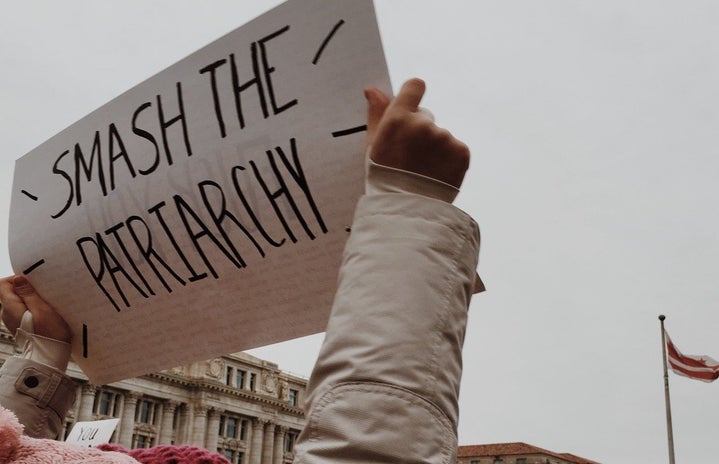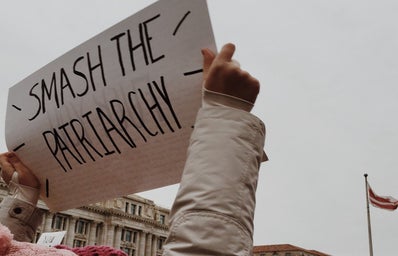As I write my first article for Her Campus at MSU, I can already feel the imposter syndrome creeping up on me. This is mostly since I’m not a her; I’m a trans man that uses he/him pronouns. Is this really a space I should be creating content in?
I know I’m not the only man to ever have this kind of thought. In my case specifically, I’m a man writing for an online magazine dedicated to, written by, and focused on empowering college women. As a more general thought, it’s hard to be part of a conversation on feminism and equality if you don’t know much about the subject at hand. It’s a social risk to look ignorant and uneducated, especially when this conversation is so impactful on the lives of half our population.
That being said, should we avoid talking about feminism and equality altogether?
I’ll give you a hint: the answer rhymes with “Joe.” Yes, misogyny negatively impacts women the most severely. Yes, women need to be uplifted and centered in the conversation about feminism and misogyny. With all of that in mind, we all face the repercussions of a misogynistic society in countless ways. We can’t show authentic emotion since we risk losing our “manhood” card. We avoid vulnerability for the same reason. We stay silent when getting sexually assaulted and raped because there are real social repercussions from doing so. This list truly goes to the ground.
How can we care for women while also caring for ourselves? How can we make an impact on such a large-scale societal issue as one man?
Let’s talk about it. As we discuss, I charge you with this task: challenge yourself. Own up to the times where you’ve contributed to misogyny. All of us have, and it’s not always intentional, but impact is more important than intent. Reflect on why the instance(s) happened: societal pressure, ignorance, and lots of other reasons can (and likely did) contribute to these actions. From there, learn from your mistakes and use these guiding points to be a better you, starting right now.
Listen, Believe, and Support Women
Look at these numbers. They are heartbreaking and blood boiling. One in five women has experienced rape or almost being raped. Chances are, you know a few (at least) of these women. If you continue to scroll through these statistics, you’ll see that only 2-10% of rape allegations are deemed false claims, and the research used for this statistic can be found here.
If a woman opens up to you about her hardships, you need to listen and not get defensive. Her experiences are not up for debate, whether it’s rape, sexual assault, feeling unsafe, hearing sexist comments in the work place, not being taken seriously due to her womanhood, or whatever her experience may be. If your instinct is to debate with her, or to brush it off as not a big deal, ask yourself why. The answer isn’t going to be pretty, but it needs to be answered so you can grow and be better.
While you’re listening and believing, ask what you can do to support her. Does she just need someone to listen? Does she need you to talk to someone in order to prevent future instances of sexism and danger? Does she want advice? Don’t assume what she wants and what she needs: ask. If she knows, she’ll tell you.
Take Accountability for the Mistakes You’ve Made
Part of listening to women is going to include being told you’re wrong on some things. As a man, you likely have an idea on what it’s like to experience the world as a woman, whatever that picture may be. You may think this view is enough to talk over women in the conversation about women (also known as mansplaining). Once again, it all comes back to being defensive: don’t do it. Everyone is wrong sometimes, and being wrong doesn’t make you evil. It’s important for all of us to constantly be learning from our ignorance and our mistakes. Don’t shut down if a woman tries to change your perspective on feminism based on something you said or did. Listen, reflect, and improve for next time. Simple as that.
Be Yourself
Sorry to sound like a Disney Channel original movie, but it’s so important to be authentic. You’ll need to add this task on your reflection to-do list if you particularly try to avoid feminine traits. Ask yourself, what’s wrong with being perceived as feminine? If this topic makes your head hurt, I’d recommend reading this article, which explores why men avoid femininity and the problems that come along with that practice.
Dare to be you, dude! What is something you’ve always wanted to do but haven’t because you’re afraid of being perceived as feminine? Have you wanted to wear jewelry or paint your nails? Have you been dying to open up about something in your life but haven’t because you’re afraid of what the bros might think? I get it, and everyone else gets it too. If you need permission to make a life change along these lines, big or small, this is it. Go for it!
How does being yourself benefit feminism? Simple answer: it takes the negative connotation away from femininity. There is absolutely nothing wrong with anyone of any gender doing things that we as a society see as feminine. Avoiding femininity contributes to the notion that masculinity equals good and femininity equals shameful, which is not good to put it lightly.
See Something, Say Something
Rape and sexual assault jokes aren’t funny. If your buddies are making them, it’s best to tell them to cut it out, but at the very least don’t laugh along. These jokes may seem harmful, but they are for many reasons. You never know who’s been a victim of rape or sexual assault. Even if you’re in a group of all men making these jokes, you run the risk of taking a very real experience someone in the room has had and making a joke out of it. If we go back to these statistics, you’ll see that 43% of men have experienced sexual harassment/assault. There is a very good chance that if you’ve made a joke like that yourself, or laughed along to a joke about it, you’ve re-opened a wound in someone that will never fully heal. It’s never acceptable, so don’t tolerate it and don’t participate.
Jokes about rape and assault aren’t the only ones that aren’t funny. I can’t count the amount of times I’ve heard people make fun of women’s bodies and overall appearances, what they’d do to women if they had the chance, how much they think a certain woman is a “bitch” or a “whore,” and the list continues. If you wouldn’t say it in front of a woman, don’t say it when you’re alone with your male friends and don’t tolerate it when they do it.
This rule also applies to extreme circumstances, such as witnessing or becoming aware of a rape or sexual assault. I don’t care if it’s your buddy, and you shouldn’t either. If you witness an act of violence, report report report. Don’t give people the power of getting away with these crimes.
Let’s Wrap This Up
Personal anecdote: as I mentioned in the beginning, I’m a trans male. I began transitioning at age nineteen, less than a year ago, and this has led my experiences to be mainly from a female lens. I’ve learned that existing as a woman is really hard. I’ve also learned that being a man and hearing disgusting comments about women in a group of only men is also really hard, and especially as someone who’s experienced so many of these targeted words and dangers first-hand.
From man to man, we have a moral responsibility to be better. I hope this list has given you a good place to start as you reflect on your past to change yourself for the better. Let’s be better together, starting right now.


